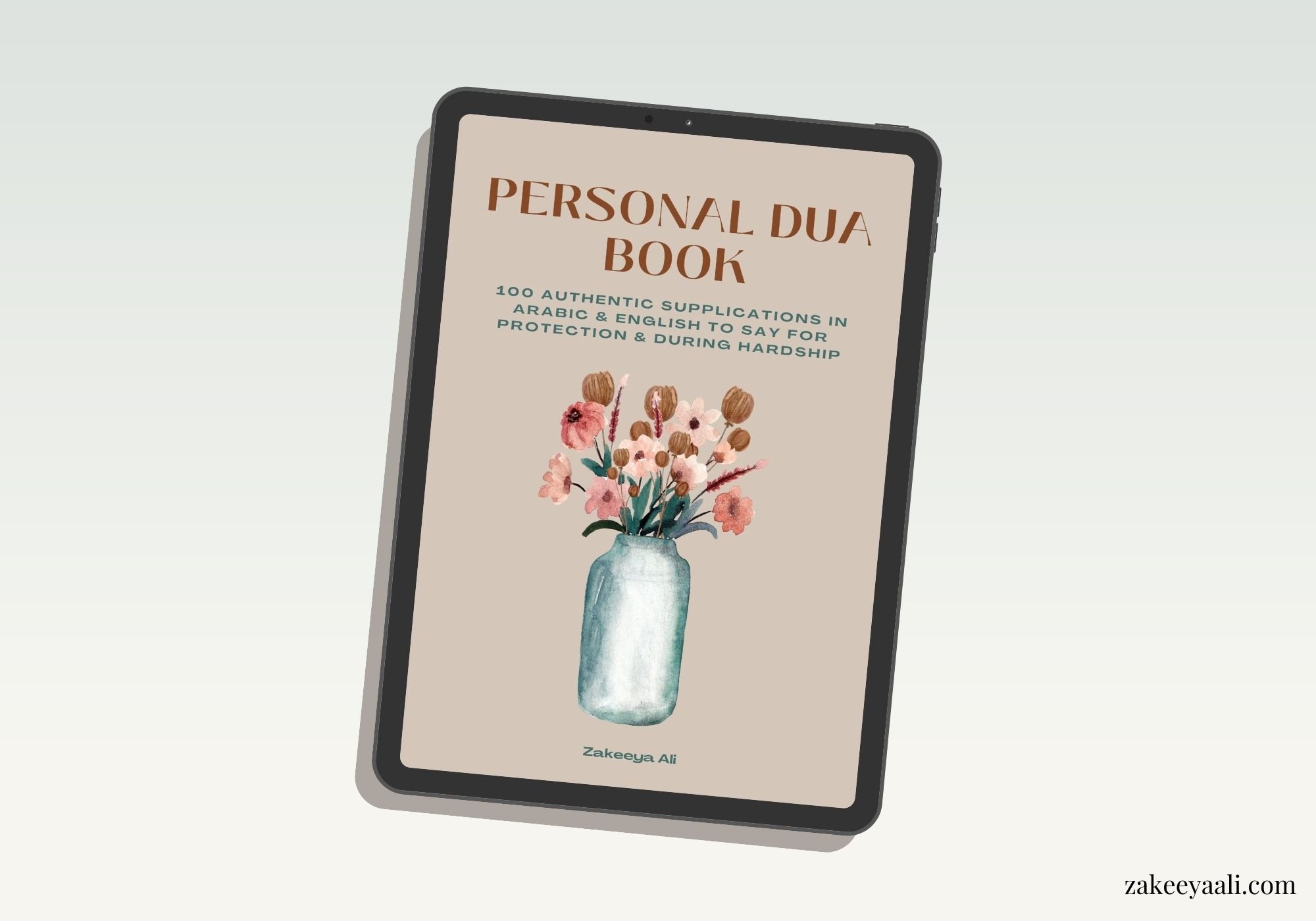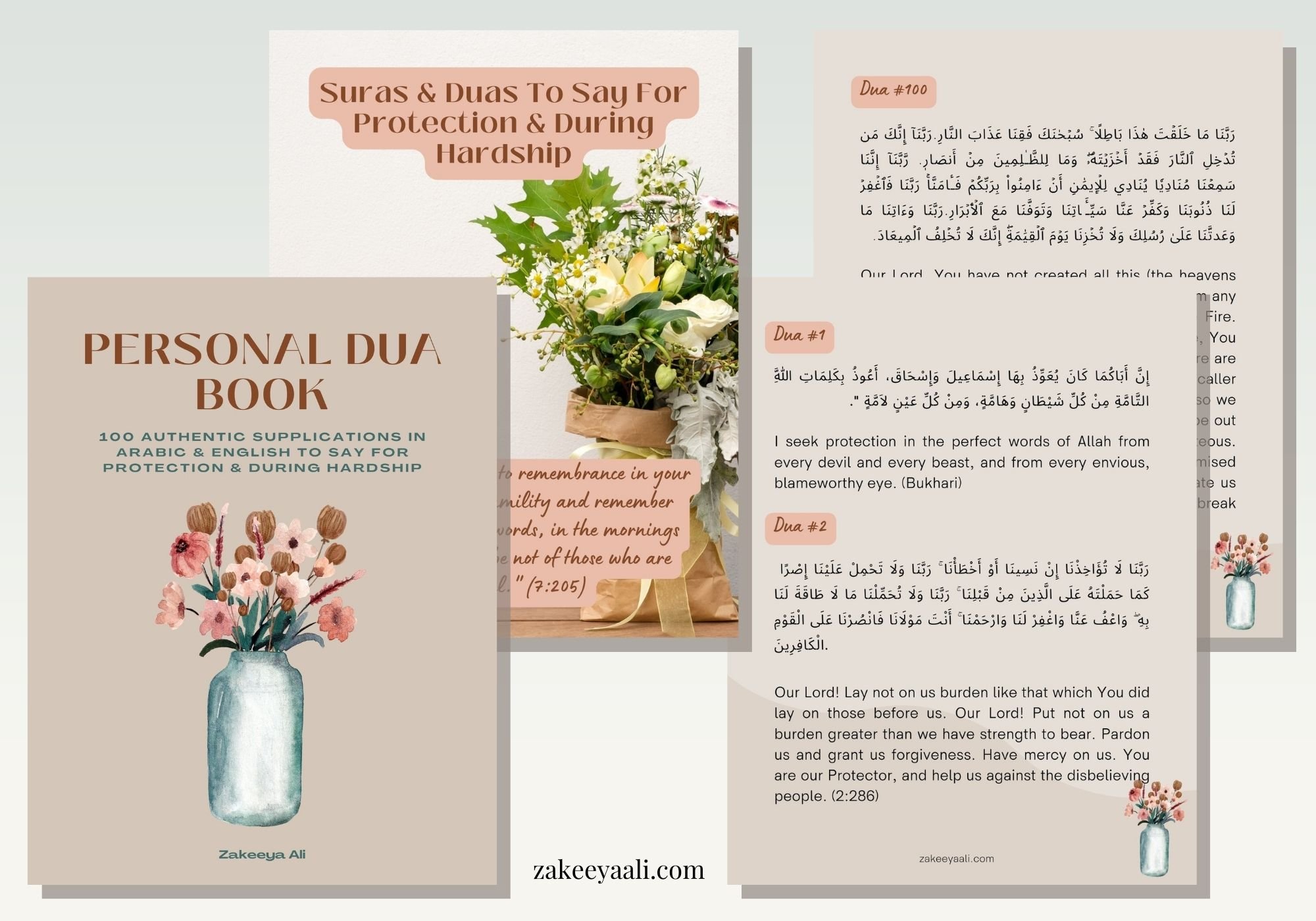How To Get Your Duas Accepted
This article is Part 2 of my Dua Series. Read Part 1 - Why I Love Dua As A Muslim to see how I implement duas in my daily life.
The Prophet PBUH mentioned:
"In the last third of every night our Lord (SWT) descends to the lowermost heaven and says: Who is calling Me, so that I may answer him? Who is asking Me, so that I may grant him? Who is seeking forgiveness from Me, so that I may forgive him.” (Bukhari)
Do you sometimes wonder why your duas don't get answered? Maybe there's something more to simply saying dua and hoping for the best. I researched my dua and discovered that there are ways to get your dua answered more effectively.
Firstly, there are situations where your dua is accepted.
Secondly, there are times when your dua is accepted.
Thirdly, there are prerequisites for your dua to be accepted.
Situations when your dua is accepted
The scholars have mentioned that if you find yourself in any of the situations below, it is ideal for your dua to be accepted.
A person who has been wronged or oppressed.
A person who is going through a severe difficulty after a calamity.
A person who is traveling.
A person who is fasting.
A woman in labor.
A person who is reciting or finished reciting the Quran.
A person who is performing Hajj or Umrah.
A person who makes dua for someone in their absence (when you make dua for someone in their absence, an angel says, "Ameen and to you").
A person who is in a state of remembrance of Allah frequently.
A person who is a just ruler.
Times when your dua is accepted
Scholars have mentioned these times as the best for dua to be accepted, and it is the Sunnah of the Prophet PBUH.
The early morning hours (the last portion of the night until the start of fajr—divide the night between maghrib and fajr into three parts).
After the adhan.
During the salah (when a slave is closest to his Lord in a prostration state or before the end of salah after finishing the tashahhud).
After the obligatory prayers.
A period of time on a Friday (some scholars say it is when the Imam sits down between the two khutbahs, and some say it is the last period of time before Maghrib).
When waking up at night, after performing wudu.
Before drinking the waters of Zamzam.
During the month of Ramadan.
During laylat-ul-Qadr (The Night of Decree).
While visiting the sick.
When rain falls.
At places such as Mecca, Arafat, and Medina (when one goes for hajj or umra).
Prerequisites for your dua to be accepted
“Verily, Allah is pure and does not accept save what is pure. And verily Allah has commanded the believers with that which He commanded the messengers, for He Most High said, ‘O messengers! Eat from those things pure, and do righteous deeds” (Muslim)
It is mentioned that for our duas to be answered, certain prerequisites should be met:
Your income needs to be lawful.
Your food must be pure and halal.
You must repent for your sins (make tawba).
You should remove all the unlawful things from your life.
Ensure you are performing the basics: praying five times a day, paying zakat, fasting in Ramadan, etc.
You should make dua with sincerity and a focused mind and heart.
You should feel with absolute conviction that Allah SWT will answer your dua, and no one can answer it but Him. The Prophet PBUH said:
"Call on Allah while having full conviction that He will answer, and realize that Allah does not answer the dua that proceeds from a heedless, inattentive heart." (Tirmidhi)
Giving the thing being asked, warding off the harm that would have otherwise afflicted a person, or as gifts awaiting the person in the next life (this is the best form of dua being answered, as mentioned in Hadith Ahmed).
To perform a good deed before your dua and say it during your dua (as was done by the three men that were trapped in a cave by a large rock: each of them made dua and mentioned a good deed, and the rock moved a bit with each dua until they could escape—Sahih Bukhari).
To begin and end the dua with praise of Allah SWT.
To send salutations and peace upon our Beloved Prophet PBUH. A companion once sat to make dua and started with praise of Allah and salutation upon the Prophet PBUH, to which he responded:
"Ask, and you will be given. Ask and you will be given." (Tirmidhi)
Generally, try and keep your tongue moist with the praise of Allah, for gratitude itself increases blessings. Allah SWT Says:
"Indeed, if you show Me gratitude, I will surely increase you" (14:7).
And the Prophet (SAW) highlighted this when he said,
"The very best dua is Alhamdulillah (All praise is for Allah)." [Sahih Ibn Hibban]
To pray salat-ul Haja (the prayer of need) when possible.
How it all comes together…
Start your dua by:
Affirming your belief in Allah SWT - Shahadah.
Asking Him for forgiveness - Istighfar.
Praising Allah SWT - Al-Hamd.
Sending blessings on the Prophet PBUH - Salawaat.
The Prophet PBUH said:
"Praise be to Allah. We seek His help and forgiveness. We seek refuge with Him from the evils of our souls. Whoever Allah guides, none can lead astray, and whoever Allah leads astray, none can guide. I testify that there is no god but Allah, and I testify that Muhammad is His slave and Messenger.” (Ibn Majah)
Here is an example of how to prepare for dua:
Say the Shahada - I bear witness that there is no god except Allah Alone without any partner, and I bear witness that Muhammad is His servant and messenger.
Say Astaghfirullah x 3 - I seek forgiveness from Allah.
Say Alhumdulillah x 3 - praise be to God.
Say Subhanallah x 3 glory be to God.
Say Allahu Akbar x 3 - God is Great.
Say Salallahu Alayhi Wassalam x 3 - peace and blessings upon His Messenger.
Call on Allah with yearning, longing, and being humbled using His Best Name of Al-Hayy (The Ever-Living) Al-Qayyum ( The Self-Sustaining).
Express your need for Him and place all of your hope in Him Alone.
Tell your Lord that you have no one else to turn to and follow the Sunnah of raising your hands when making dua, ideally while in a state of wudu and facing the qibla.
Allah SWT Says:
"Call on your Lord with utter humility and in private" (Quran 7:55)
He SWT also Says:
"And call on Him with fear and longing: surely, the mercy of Allah is near to people of excellence." (Quran 7:56)
Remember…
We should not have fear in our hearts that our dua will not be answered due to our shortcomings or feeling like we are not deserving of it.
We are told that our "longing" for Allah to answer our dua out of His limitless generosity and mercy should overcome that fear.
Calling on Allah SWT for our need is an act of worship, and Allah loves to be called upon.
It is the trickery of shaytaan when he makes us believe that we are not worthy of our dua being accepted. Be careful of having that frame of mind that makes you think you're being humble, when in fact, you're too arrogant to ask your Lord for help. After all, we are nothing without Allah SWT, so do we really think we don't need to ask for His help? The Prophet PBUH taught us that dua is:
"The very essence of worship." (Tirmidhi)
We should be patient and realize that Allah SWT has full knowledge of our problems and is in complete control of our circumstances. He will respond to our dua based on what is best for us and the most appropriate time.
We must persevere in our dua and not give up if we don't get an immediate response.
When our dua is answered, we should remember that Allah SWT knows what is best for us, even if we may dislike the outcome at first.
The Prophet PBUH said:
“A man’s (Du`a) may be answered so long as it does not involve sin, severing the ties of kinship, or hastening.” It was said: “O Messenger of Allah, what does hastening mean?” He (peace and blessings of Allah be upon him) said: “When he says, ‘I made Du`a and I made Du`a but I did not see any response,’ so he gets discouraged and stops making Du`a.” (Sahih Muslim)
Allah SWT Says:
"Perhaps you would hate a thing while it is good for you, and perhaps you would like something that is bad for you—Allah knows, and you know not." (Quran 2:216)
He SWT also Says:
"Perhaps you would hate a thing, yet Allah places much, much good in it." (Quran 4:19)
Allah SWT will only bestow upon us His good pleasure (rida) and divine care ('inaya); we simply need to ask!
Join me again for part 3 of my Dua Series, How I Start And End My Day With Dua, where I will share my routine of dua in the morning and in the evening.
Recommended Read
The Book of Remembrance (Kitab Al-Adhkar) by Imam Yahya ibn Sharaf an-Nawawi
This is a thick, in-depth book with a compilation of words of remembrance and glorification (dhikr), and supplicatory prayer du'a, to the Lord of the Universe as related from His final messenger Prophet Muhammad PBUH.
Salam, I’m Zakeeya!
I believe that making our homes a safe haven for our families, as well as being a wife and mother, brings us great blessings, contentment, and benefits to society as a whole. Since 2011, I've been dedicated to assisting Muslimas in finding tranquility in their roles, taking better care of themselves, and achieving inner peace. Our journey in this world is not an easy one, but I pray the tools and guidance I offer will help you face life's challenges with more gratitude and mindfulness. Join me as I share wifehood, motherhood, homemaking, and lifestyle solutions that make life more fulfilling for you as a woman! Read more about me here.
Do You Need Support as a Sister?
If you are struggling in your life and need professional support for personal development, you can book a one-on-one mentoring session with me to get tailored advice.
Do You Want to Instill Your Daily Dose of Dua?
Order my handy dua ebooks, which are available in an Arabic/English or English only version, and contain 100 authentic duas to say for protection and during hardship.






